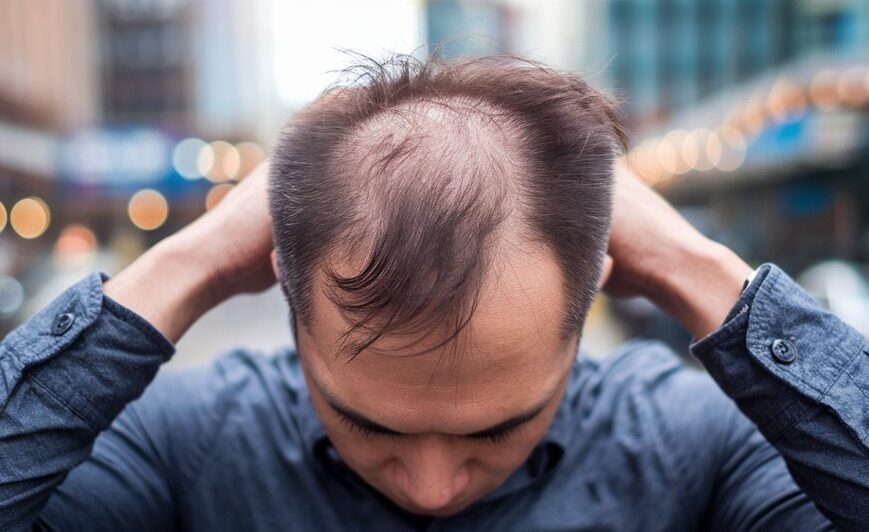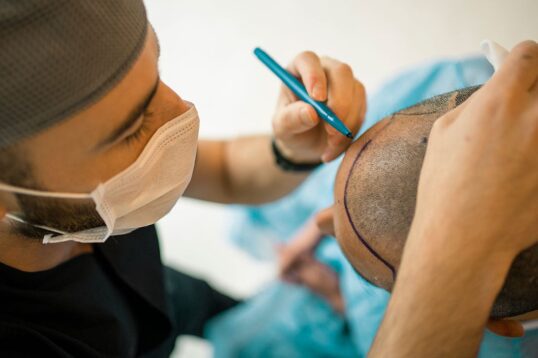Have you ever noticed more hair on your brush than usual? Or maybe your hair feels thinner and weaker?
You might be dealing with something more common than you think: Vitamin B12 deficiency can cause hair loss.
Let’s break it down, shall we?
Vitamin B12 is crucial for keeping your hair strong and healthy. When your body doesn’t get enough B12, it struggles to produce red blood cells. These red blood cells carry oxygen to your hair follicles. Without enough oxygen, hair follicles weaken, leading to thinning, shedding, or even complete hair loss.
So, if you’re noticing more hair in the drain or on your brush, and you’re feeling tired, dizzy, or low on energy, it might not just be stress or a bad hair day. Vitamin B12 deficiency and Vitamin D Deficiency could be the hidden cause of your hair loss.
Good news, though—it’s treatable.
What Is Vitamin B12?
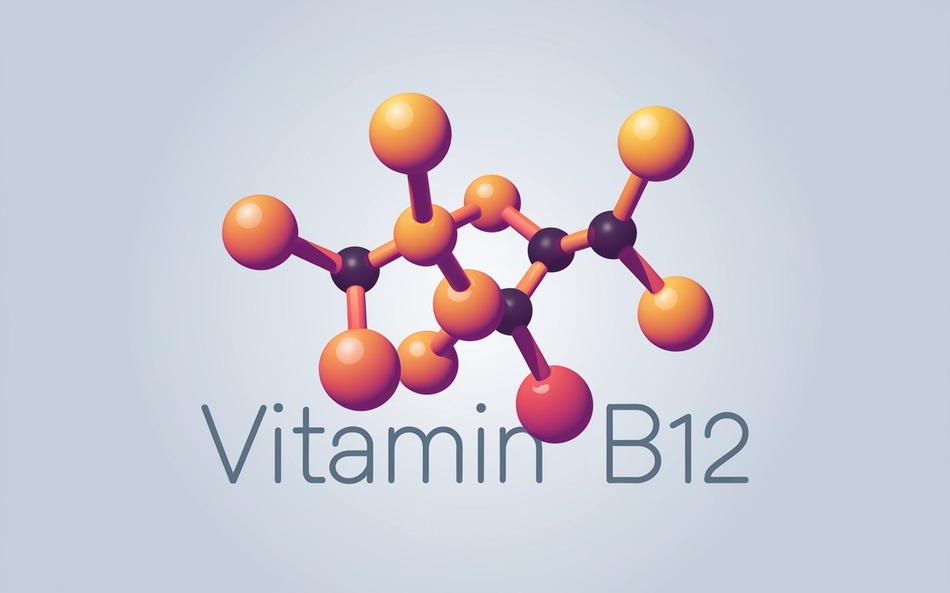
Vitamin B12, also known as cobalamin, is a water-soluble vitamin that plays several vital roles in your body:
Vitamin B12 is vital for energy production, neurological function, and the maintenance of healthy hair and skin. A Vitamin B12 deficiency can cause hair loss and including various health issues.
How Does Vitamin B12 Deficiency Affect Hair?
Vitamin B12 is essential for various bodily functions, particularly for healthy hair growth. When you’re deficient in this vitamin, your body struggles to produce enough red blood cells.
These cells are responsible for delivering oxygen to your scalp and hair follicles. Without sufficient oxygen, your hair follicles weaken, leading to hair thinning and loss.
Why Does Vitamin B12 Deficiency Cause Hair Loss?
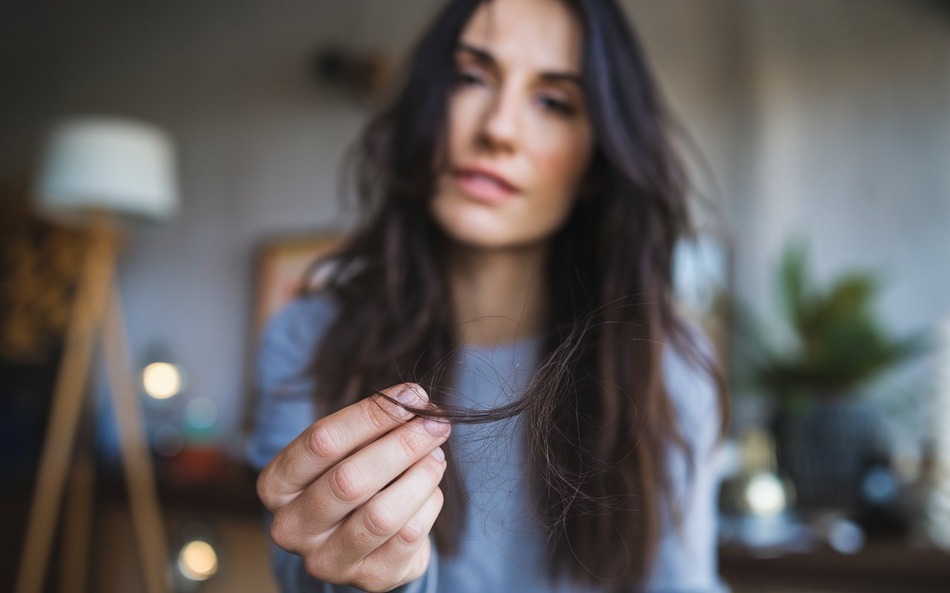
- Hair Follicle Health: Vitamin B12 deficiency can cause hair loss because it directly affects the health of your hair follicles.
- Oxygen Supply: Without adequate B12, the oxygen supply to your hair follicles decreases.
- Impact on Hair Growth: A lack of B12 can result in several issues, including:
- Hair Thinning: Reduced nutrients and oxygen weaken the hair follicles.
- Bald Patches: In severe cases, deficiencies can cause noticeable bald spots.
- Weakened Hair Follicles: The lack of oxygen makes hair follicles fragile.
- Noticeable Thinning: As the follicles struggle to function properly, you may notice thinning hair.
- Increased Shedding: This leads to more shedding, which can result in visible patches of hair loss.
During recovery, avoid heat styling tools, chemical treatments, or tight hairstyles that can further stress weakened hair follicles. Give your hair time to recover by using gentle hair care products.
How to Know If Vitamin B12 Deficiency Is Causing Your Hair Loss
Is it true that a deficit in Vitamin B12 deficiency can cause hair loss? Watch out for the following important indicators:
If you also have these symptoms, it’s possible that a vitamin B12 deficiency can cause hair loss. Hair thinning or shedding occurs when low B12 levels deprive hair follicles of oxygen. Verify your B12 levels and take care of any deficiencies if any of this sounds familiar.
Who’s at Risk for Vitamin B12 Deficiency and Hair Loss?
Not everyone gets enough Vitamin B12, and certain groups are more prone to vitamin B12 deficiency can cause hair loss. Here’s a closer look:
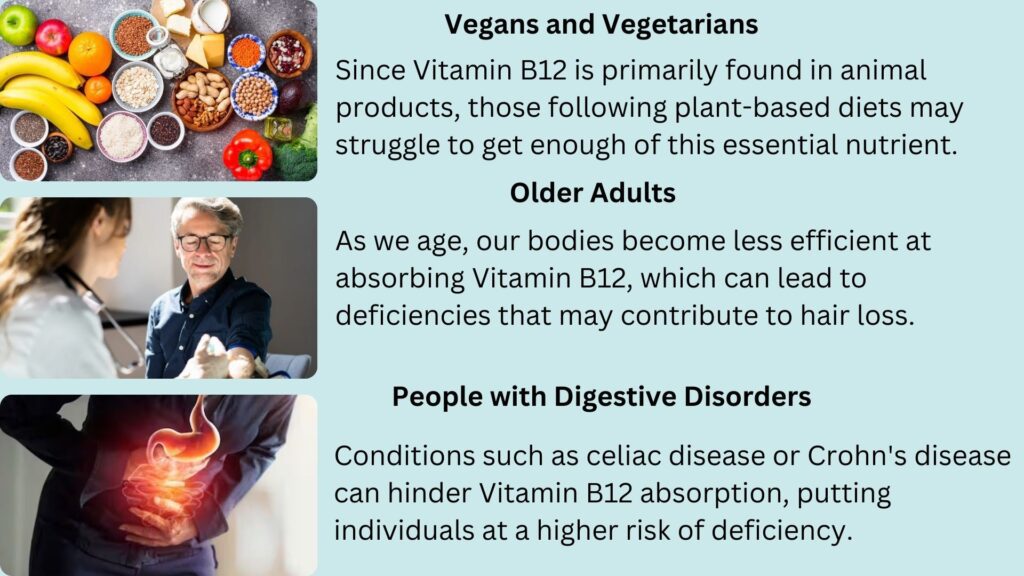
If you fall into one of these categories, it’s essential to monitor your hair health and consider keeping track of your Vitamin B12 levels. Taking proactive steps can help prevent potential hair loss related to vitamin B12 deficiency can cause hair loss.
Get regular blood tests to check your Vitamin B12 levels, especially if you’re at risk of deficiency (e.g., vegetarians, vegans, or older adults). Keeping track of your B12 levels helps prevent deficiencies and can address hair loss early.
Diagnosing Vitamin B12 Deficiency: Tests You Should Know
Wondering how to find out if your Vitamin B12 levels are low? Here’s what you can do:
- Blood Test: A simple blood test can measure your B12 levels. This is often the first step in diagnosing a deficiency.
- MMA Test: The Methylmalonic Acid (MMA) test checks for elevated levels of methylmalonic acid in your blood or urine. High levels indicate that your body is not getting enough B12.
- Homocysteine Test: This test measures homocysteine levels in your blood. Elevated homocysteine can also suggest a Vitamin B12 deficiency.
Don’t hesitate to consult your doctor about these tests. They can help determine the best course of action based on your symptoms and test results. Taking these steps is essential to prevent linked to Vitamin B12 deficiency can cause hair loss.
Hair regrowth after correcting takes time, a Vitamin B12 deficiency can cause hair loss usually several months. Consistency in treatment is key, so stick with your diet or supplements, and be patient as your hair grows back stronger.
Treatment Options for Vitamin B12 Deficiency to Prevent Hair Loss

If you discover that Vitamin B12 deficiency can cause hair loss, don’t panic. There are plenty of ways to boost your B12 levels and get your hair back on track.
Here’s how to tackle it:
Dietary Changes
- Include more B12-rich foods in your diet, such as eggs, dairy, meat, and fish. These are excellent natural sources of B12.
- If you’re vegetarian or vegan, consider fortified foods like breakfast cereals, plant-based milk, or nutritional yeast.
Supplements
- Talk to your doctor about taking a B12 supplement. They can recommend what’s best for you based on your specific deficiency.
- You have several options, including:
- Pills: Easy to take daily.
- Sublingual tablets: Dissolve under your tongue for quicker absorption.
- Injections: If your levels are significantly low, a quick boost via B12 shots may be necessary.
By addressing your deficiency, not only will your energy improve, but you’ll also help prevent further hair loss. Raise those B12 levels, and your hair might just thank you!
If you’re unable to get enough Vitamin B12 from food, speak to your doctor about taking supplements.Options include oral tablets, sublingual (under the tongue) tablets, and B12 injections for more severe deficiencies.
Lifestyle Changes to Address Vitamin B12 Deficiency and Support Hair Health
Making small changes can lead to significant improvements. If you’re dealing with Vitamin B12 deficiency can cause hair loss, here are some lifestyle tweaks to help support your B12 levels and promote healthier hair.
Balanced Diet
- Focus on a variety of B12-rich foods, such as lean meats, fish, eggs, and dairy.
- Include other vitamin-packed foods, like leafy greens and fruits, to ensure you’re not missing out on essential nutrients.
- For vegetarians and vegans, opt for fortified foods like plant-based milk or cereals to get that essential B12 boost.
Regular Check-ups
- Stay on top of your health with regular blood tests. This is the best way to monitor your B12 levels and overall well-being.
- Consult with your doctor to track your B12 levels and adjust your diet or supplements as needed.
Stay Hydrated
- Drink plenty of water. Staying hydrated is essential for overall health, including hair health.
- Proper hydration supports your scalp and ensures nutrients are efficiently delivered to your hair follicles.
By incorporating these simple lifestyle changes, you can better manage Vitamin B12 deficiency can cause hair loss and support your hair’s health in the long run.
Chronic stress can exacerbate hair loss. Practice stress management techniques like meditation, deep breathing, or regular exercise to improve overall health and support hair growth.
Conclusion
If you’re experiencing hair loss, don’t underestimate the possibility that Vitamin B12 deficiency can cause hair loss.
Getting enough of this essential vitamin is critical for maintaining not only your overall health but also your hair’s strength and vitality. Vitamin B12 deficiency can cause hair loss weakens hair follicles, leading to thinning and shedding. But the good news? It’s preventable and treatable.
So, take action:
- Adjust your diet to include more B12-rich foods.
- Consult with a healthcare professional for the right supplements or treatments.
The sooner you address this issue, the quicker you’ll see improvements.
Trust me, your hair will thank you!
FAQs
Can Vitamin B12 deficiency cause hair loss?
Yes, Vitamin B12 deficiency can cause hair loss. B12 is essential for red blood cell production, which carries oxygen to hair follicles. Without sufficient oxygen, hair follicles can weaken, resulting in thinning or shedding hair.
How do I know if I have a Vitamin B12 deficiency?
Common symptoms of Vitamin B12 deficiency include fatigue, weakness, pale skin, dizziness, mood changes, and hair loss. If you’re experiencing these symptoms, consider getting your B12 levels checked through a blood test.
What foods should I eat to increase my Vitamin B12 levels?
If you eat animal products, include more meat, fish, eggs, and dairy in your diet. For vegetarians and vegans, fortified foods like nutritional yeast, plant-based milk, and breakfast cereals are excellent sources of Vitamin B12.
Are B12 supplements effective for preventing hair loss?
Yes, B12 supplements can be effective in correcting deficiencies and preventing hair loss. Depending on the severity of your deficiency, options include pills, sublingual tablets, or injections. It’s best to consult with a healthcare professional to determine the most suitable option for you.
How long does it take to see results after treating Vitamin B12 deficiency?
Once you start addressing a Vitamin B12 deficiency, you may notice improvements in your energy levels within a few weeks. However, hair regrowth can take several months, as hair grows slowly. Consistency in treatment is key.
Can hair loss from Vitamin B12 deficiency be reversed?
Yes, if hair loss is due to Vitamin B12 deficiency, correcting the deficiency can often reverse the hair loss and promote healthy regrowth. However, the extent of recovery can vary based on the duration and severity of the deficiency.
Who is most at risk for Vitamin B12 deficiency?
Individuals at higher risk for Vitamin B12 deficiency include vegans and vegetarians (who may not consume enough animal products), older adults (who may have absorption issues), and those with certain medical conditions that affect nutrient absorption, such as celiac disease or Crohn’s disease.
Is it safe to take Vitamin B12 supplements without consulting a doctor?
While Vitamin B12 is generally considered safe and has a low risk of toxicity, it’s always best to consult with a healthcare professional before starting any new supplement regimen. They can guide you on the appropriate dosage and form based on your individual needs.
